President’s Message
Dear Colleagues,
We all know about the national movement towards student learning outcomes (SLOs). Indeed, the development of SLOs has been a real focus for the college over the last several years and will continue to be a college priority. However, with so much emphasis on SLOs and assessment, my fear is that we will lose sight of other important educational policy matters. In addition to SLOs, I would like to discuss three other important initiatives.
First, we must strengthen our educational planning process. In fact, this issue was identified in our accreditation self-study. At the most fundamental level, we should better understand the educational needs of our students and our community, and offer programs and services that best meet those needs. Furthermore, it is important that we rely on data to inform our decisions about the ultimate educational direction of the college.
We cannot afford to miss the mark with our program and course offerings. For the last two years we have spent our entire budget allocation. In fact, we have spent more than our budget allocation. For those of you who missed the recent all-college meeting on our budget status, I need to mention that 97 percent of our budget covers salaries. Furthermore, the bulk of our salary costs fund faculty and classified positions that are directly tied to the classroom and to student support services.
A key point that I want to make is that given these conditions, it is not a question of how much we should spend. That question has already been answered—we spend it all. Rather, it is a question where to spend our money. In short, if we say "yes" to one program or initiative, we are in effect, saying "no" to other programs and initiatives. Over the long run, we need to be very careful about what we say "yes" to. It is the educational master plan that will provide the overall framework for these very important decisions. I urge you to attend the all-college meeting on Wednesday, April 16 from 2:15-4:00 p.m. in 18-204, so that you can hear directly from the faculty and staff who serve on the Educational Master Plan Committee regarding their efforts.
I feel that another important educational direction for the college is to continue to support faculty, classified staff, and administrator development efforts. As you well know, there are structures in place to provide funding for conferences and other projects for all personnel. These opportunities have been available since the passage of AB 1725—a key piece of legislation which more formally defined shared governance roles. We are no different from every other community college in this regard.
What is unique about CSM is our commitment to the scholarship of teaching and learning (SoTL). While it is important to continue to fund individual requests and to leave the funding model for our existing professional development programs intact, it is equally important to come together to discuss pedagogy and to share best practices. Over this last year there have been a series of wonderful presentations and discussions hosted by the SoTL Center. In addition, we have also launched our SoTL Scholar program—a joint effort between CSM and Cañada College. I believe that community colleges are the best teaching institutions in the world. At CSM, we should be very proud of our leadership stature and of our innovative practices to improve student learning. We need to continue to support this effort.
Another important educational direction for us is to work with our high school colleagues to strengthen high school-to-college success. Approximately 70 percent of our incoming freshmen place at a level below transfer in English and math. About 60 percent of our freshmen continue with us in the following spring semester. While this number is about average for all California Community Colleges, it is unacceptable.
As a faculty member I can remember making a point to then-college president Peter Landsberger that we spend all of our time focusing on where our students are going—and too little time making the effort to understand where are students have come from. Unfortunately, not much has changed since that discussion 15 years ago. I believe that it is time to take a leadership position on this matter. I encourage you to read the excellent article by Jeremy Ball and Susan Estes in this issue of eNews. Jeremy and Susan outline some very concrete steps that CSM can take to begin to address this issue. This problem is a nationwide concern, and the action steps that Jeremy and Susan have identified represent some of the best research and thinking on this matter.
In closing, I recognize that no policy will ever substitute for great individual classroom instruction or student support services. However, we must continue to remind ourselves that our students experience the entire college—not just one classroom faculty member or counselor; it is the sum of these individual interactions that define our students' experiences, and thus, our ultimate success. We are connected by our students and we are dependent on one another for our students' success. I see the development of clear, deliberate educational polices and strategies as a means of continually improving the student experience and meeting the needs of our community.
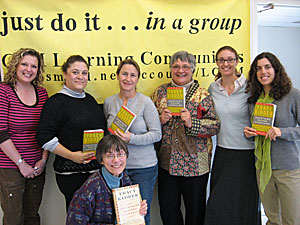 SoTL News SoTL News
By Jean Mach, professor of English and SoTL center coordinator
Your SoTL Center
Derek Bok, in Our Underachieving Colleges, calls for thoughtful but profound changes throughout higher education. Near the end of this provocative book, he underscores the point that faculty members themselves can be driving these changes: “. . .many individual professors are engaging in small-scale classroom assessment and research to examine their own teaching methods and try out new techniques for stimulating learning. Many are coming together on their own campuses to discuss their common pedagogic interests” (342).
Indeed, at College of San Mateo, this internal process of sharing ideas, problems, and solutions having to do with teaching and learning takes place on many levels and in many arenas. The dialogue is often creative and insightful. But perhaps more on campus would benefit if it were more public. Most of us enjoy hearing about work in other departments, buildings, programs, and classes, but there seem to be too few formal or informal opportunities for such sharing.
CSM’s Center for the Scholarship of Teaching and Learning (Building 12, Room 170) provides an airy and comfortable place for such activities. All are invited to use the rooms in various ways to promote the discussion of teaching and learning on our campus. If you need a key, please place an order through your division office. To check on availability of the rooms, please contact me: Jean Mach at mach@smccd.edu.
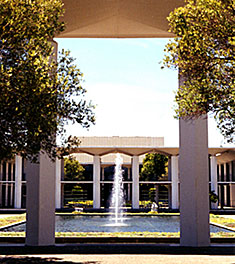 Nominations Open for Spirit of CSM Awards Nominations Open for Spirit of CSM Awards
By Fauzi Hamadeh, Spirit of CSM committee member
Do you know an individual or group who embodies the mission and vision of CSM? Do you know someone who carries out the goals and values of the college in an exceptional way? Is there someone on campus or in the community who you consider synonymous with CSM? If so, nominate that person or group for the Spirit of CSM award.
College of San Mateo has created the Spirit of CSM Award to recognize individuals or groups who are outstanding in exemplifying the values of our college. Two awards will be made annually, one to a CSM member or group and one to a community member or group. In order to be eligible for the Spirit of CSM Award, a nominee should help the college fulfill its mission in being a student-centered, collaborative, creative institution that is appreciative of diversity. Nominees can be CSM faculty, staff, administrators, and students, or members of the community.
Nominations are open until April 30, 2008. At that time, President Mike Claire, in consultation with College Council, will select the awardees. Recipients of the award will be recognized at the college's opening day activities for fall 2008. In addition, recipients will receive an award and their names will be memorialized on a plaque in the President's Office. More information, including nominating forms, is available at the http://www.collegeofsanmateo.edu/spiritofcsm. If you have questions about the Spirit of CSM award, please contact Fauzi Hamadeh at hamadehf@smccd.edu.
Starting the Dialogue Around High School-to-College Success
By Jeremy Ball, president, Academic Senate, and Susan Estes, vice president of instruction
"If everyone needs an education through two years of college or the equivalent, then the nation has an obligation to provide a far more certain pathway for post-secondary success than it does now." This imperative from the Introduction to Minding the Gap: Why Integrating High School with College Makes Sense and How to Do It (2007) challenges us, as college educators, to participate in finding a solution to the very real issue we meet daily: approximately seventy percent of CSM's students taking placement tests in English, math, and reading place below transfer level. Although these students are placed in developmental courses taught by professors dedicated to helping students reach their goals, evidence suggests that these basic skills students do not succeed as often as we would like because they do not have needed foundational knowledge and skills.
In "Challenges in the Transition from High School to College" in Minding the Gap , David Conley, founder and director of the Center for Educational Policy Research and of the Educational Policy Improvement Center, identifies two factors essential for student success in college: foundational knowledge, especially in reading, writing, and math, and "habits of mind." Conley's article points to two areas which call for much closer collaborative work between high school faculty and college faculty: aligning the curricula and teaching students how to think like students. For example, frequently the high school English curriculum emphasizes literature rather than writing; yet, when students take placement tests at CSM, they are tested and placed on their ability to write. Similarly, Conley advises that it is not enough for students to know how to do math; they must be able to use logical thinking skills to use math "conceptually and procedurally." Again, high school students coming to CSM often do not know how to do this. Before students reach CSM, can we do something to ensure higher success and retention rates for those students once they enter our classrooms? One answer lies in developing stronger partnerships with local high school faculty.
First, CSM faculty can host discipline-specific conversations with their high school colleagues. The Center for the Scholarship of Teaching and Learning (the SoTL Center) in building 12 is a fitting location for this outreach activity, and the Vice President of Instruction and the Academic Senate are ready to help coordinate the conversations. Let's initiate discussions about aligning high school and college curricula by inviting high school faculty to CSM. How can high school teachers and CSM's instructors design curricula in order to create a smooth transition from high school English and math to college English and math while retaining the course material required for high schools to meet their mandated curricular content and maintaining the appropriate level of rigor for developmental or transfer-level courses at CSM? Without open, collegial, honest dialogue there is little likelihood that significant change will occur.
Second, College of San Mateo's integrative learning initiatives provide meaningful and effective models for achieving closer collaboration with the local high schools. Consider, for example, the opportunity for high school students to enrich their education by enrolling in a learning community with one high school course taught by a high school teacher and one CSM course taught by a CSM professor. What a creative, engaging opportunity for high school students to acquire the reading, writing, and/or quantitative skills they need for college success! And what an equally rich opportunity for cooperative efforts between high school and college faculty! Developing and teaching a learning community would facilitate dialogue between high school and college faculty, help students directly connect what they learn in high school classes with success in college courses, and teach high school students the discipline and other behaviors requisite for college success.
Electronic portfolios provide another tool for collaborative efforts between the local high schools and CSM. Assessing students is vital for correct placement. Using e-portfolios as a way to measure students' preparedness for a course-and perhaps as a way for students to demonstrate they have met the prerequisite for a CSM course-is an appropriate topic for discussion between high school and college faculty.
An education beyond high school is increasingly necessary for economic success in the United States. As community college educators, we must explore avenues that will strengthen our students' ability to achieve the educational goals they bring to CSM. A stronger partnership with local high schools is one path to accomplishing this objective. Consider what your department's faculty members can do to "mind the gap" and help CSM's students successfully complete the education they need for a promising future.
CSM Participates in AAC&U Initiative
CSM is one of a select group of colleges invited to participate in the Association of American Colleges and Universities’ (AAC&U) new VALUE-Plus: Rising to the Challenge initiative, funded by the Fund for the Improvement of Post Secondary Education (FIPSE) and the State Farm Companies Foundation. This project will advance the use and development of rubrics for assessing student learning of the Essential Learning Outcomes identified in the report, College Learning for the New Global Century. CSM was invited to participate in the Value-Plus initiative based on the faculty’s work on creating, utilizing and assessing ePortfolios as an approach to demonstrate student learning. The college will receive a $5,000 grant to cover expenses associated with the project and will also be featured as a participant on the AAC&U website.
.jpg) Coastside Currents Coastside Currents
By Martha Tilmann, dean of Coastside/special projects
Greetings from the new Coastside Office! Our work with the community is progressing very well. After a year of collecting local data, we identified four major audiences on the Coast: high school students/high school graduates; immigrant population/basic skills; adult learners; and tourists (education vacations).
Classes for fall include something for everyone (almost!). For the high school graduates and concurrent students there are general education courses, including English, math, history and psychology. For the immigrant population we offer several basic skills classes in ESL, reading, and computer literacy. Our adult learners are served by classes in accounting, internet programming, office assistant and others leading to certificates. Also available are several enrichment courses in floral arrangement, health, Spanish, guitar, conversational Spanish, film and art. Many classes support more than one audience, but each is selected to address specific needs of an identified group. Regarding the fourth and perhaps most unique audience, “tourists,” we are in the planning stages of building “Education Vacations.” More on that in an upcoming column! The Coastside Office is located at 225 S. Cabrillo Highway in Half Moon Bay. It is open from 8am to 5pm, Monday through Friday and can be reached at (650)726-6444.
Students Speak Focus Group Initiative
Progress Notes: Phase I
by Milla McConnell-Tuite, faculty coordinator, Office of Research, Planning & Development
About Progress Notes
Progress Notes: Phase I is an overview of progress-to-date for Students Speak, CSM's student focus group initiative. This update includes background about the initiative, a description of its goals, an overview of the research methodology, and a brief summary of findings, recommendations, and action steps undertaken.
Background
Students Speak developed in Spring 2007 as a means to identify and analyze practices at CSM which-from the perspective of students-may inadvertently contribute to the college's persistent enrollment decline. It is CSM's first college-wide initiative to use focus group methodology to capture students' perceptions of the college, including why students attend CSM, enroll in classes, and use support services. Students Speak's goals have been to: (read the full article)
Change in Campus Smoking Policy/Designated Smoking Areas
By Jennifer Hughes, vice president for student services
A new smoking policy went into effect at the beginning of the spring, 2008 semester. Smoking is now only allowed in designated areas on the campus and in parking lots. Each designated area is clearly marked and equipped with benches and an ash urn. Students been informed of the new policy through email communication and announcements by faculty in classes. Based on feedback from faculty and staff during the first few weeks of the semester, there are plans to post additional signs in areas where students may still be smoking that are not within the designated areas and a relocation of one area to move it further from a classroom. The perimeter of each smoking area will be painted so that the boundaries of each area are clear. Now that the college community has had a chance to adjust to the new policy, additional enforcement by Security will start to take place. The taskforce will be providing a report to College Council at the end of the semester to determine the effectiveness of the policy. If you wish to provide feedback, please contact Jennifer Hughes, chair of the taskforce at hughesj@smccd.edu. The revised smoking policy can be viewed by going to collegeofsanmateo.edu/csminternal/resources/reference_backup/CSM%20Smoking%20Policy.htm
Student Profile: Emanuela Quaglia
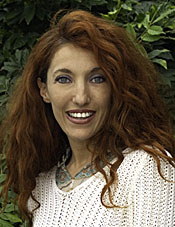 By Mike Habeeb, communications manager, PR & Marketing By Mike Habeeb, communications manager, PR & Marketing
Emanuela Quaglia, a first year student at CSM, owns her own "little piece" of a castle in the Tuscany region of Italy, near the city of Pisa. As a performing artist, actress, director and producer of theatre, she uses what amounts to a large room in a historic landmark castle to store costumes and other theatre related items; it's also her office. Sitting at CSM, thousands of miles away, Emanuela said she sees her choice piece of property clearly in her head and smiles; she'll be back to her home country of Italy this summer to work, to earn money to fund her education in the United States.
But today Emanuela, 36, is an "A" student studying broadcasting and electronic media as an international student. She's also president of the student club Mediate-started this year at for all media technology students-and an officer in the honor society Phi Theta Kappa. And, she's a student assistant for Michelle Brown, associate professor of broadcast & electronic media."I'm here to join all the skills I can get with the experience I had in Italy," Emanuela said, explaining that she could then do part of promotional and other technical work by herself, saving money for other aspects of theatre production. Savings would also help fund her own, independent media production company to produce, among other media, documentaries "that shed light on important social issues" and video for art galleries.
"Knowledge is the door to freedom of expression," she said, "and I'm here to set myself free." But why come all the way to the United States and a community college in California? "I love to travel and explore new sides of the world," Emanuela explains. "I was coming to San Francisco to look for a school because the city has a good reputation in Europe."
While on the plane coming here, Emanuela struck up a friendship with a woman who coincidentally was a former CSM employee. The woman, learning of Emanuela's educational interests, brought her to CSM for a tour and Emanuela discovered her college."The people were friendly and kind, with a nice, open-minded attitude, and I liked the relaxed atmosphere," she said, adding that on "sunny, green" days at CSM she feels that in the school she's found "the taste of my Tuscany hills."
Emanuela also found all the programs in which she was interested: broadcasting, electronic media, multimedia and graphics. She always found a welcoming International Student Program and the "family" atmosphere it creates for its students.Emanuela was as effusive about the various CSM professors as they were about her, using words like "amazing, very smart and witty.""They not only know their material, but they also know how to teach it very well," she said. Diana Bennett, an associate professor in Multimedia, described Emamuela as having "fresh and innovative ideas in her work," which is "exceptional in all facets."Michelle Brown, who calls her a "great communicator," said that Emanuela "has mastered the language of people, who she seems to read like books, sensing what they need at the time." Brown also said that Emanuela provides an international perspective in the classroom which provides CSM, it may be added, "with a taste of Tuscany."
Accomplishments & Accolades
  Two CSM basketball players have been recognized for outstanding play during the 2008 season: Hazel Mauk and Nancy Chicas. Mauk, a graduate of Mills High School, was selected First Team All-conference; she played guard and averaged 15 points a game. Chicas from George Washington High School in San Francisco, was an Honorable Mention selection; she played point guard and averaged 10 points, 5 assists and 5 rebounds per game. Two CSM basketball players have been recognized for outstanding play during the 2008 season: Hazel Mauk and Nancy Chicas. Mauk, a graduate of Mills High School, was selected First Team All-conference; she played guard and averaged 15 points a game. Chicas from George Washington High School in San Francisco, was an Honorable Mention selection; she played point guard and averaged 10 points, 5 assists and 5 rebounds per game.
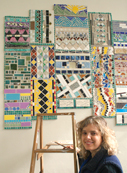
 Over the past several months, the lobby of the Administration Building has been sporting a fresh and brighter look, thanks to a new coat of paint and some new furnishings. Last month, it took on a new life with the addition of a colorful tile and glass mural, designed and created by art students in Jude Pittman’s new Mosaic Mural II class. The college commissioned Pittman’s students to create the mural; the students performed the work free-of-charge while the college will fund the materials. The piece contains signatures of the student artists. The plan is for students to create a mural for the college or for a space in the community each semester; outside agencies commissioning Pittman’s classes will also be required to pay only for materials. The mosaics are made of typical materials such as fragments of glass, metal and tiles as well as more nonconventional items such as pieces of broken dishes, dice and Legos. Be sure to visit Building 1 to admire the students’ handiwork. (Image at right: Pittman with student mural) Over the past several months, the lobby of the Administration Building has been sporting a fresh and brighter look, thanks to a new coat of paint and some new furnishings. Last month, it took on a new life with the addition of a colorful tile and glass mural, designed and created by art students in Jude Pittman’s new Mosaic Mural II class. The college commissioned Pittman’s students to create the mural; the students performed the work free-of-charge while the college will fund the materials. The piece contains signatures of the student artists. The plan is for students to create a mural for the college or for a space in the community each semester; outside agencies commissioning Pittman’s classes will also be required to pay only for materials. The mosaics are made of typical materials such as fragments of glass, metal and tiles as well as more nonconventional items such as pieces of broken dishes, dice and Legos. Be sure to visit Building 1 to admire the students’ handiwork. (Image at right: Pittman with student mural)
  Dean of Physical Education and Athletics Andreas Wolf (photo at left) was one of five former athletes inducted into the Pacifica Sports Hall of Fame 2008 class by the City of Pacifica Sports Club on February 23. Prior to coming to CSM, Wolf served 10 years as athletic director, head soccer coach and faculty member at Skyline College. During his coaching tenure, he was recognized as Coast Conference Coach of the Year. He was an All-American soccer player at San Francisco State University. His honor included recognition from California State Assemblyman Gene Mullin and State Senator Leland Yee. Dean of Physical Education and Athletics Andreas Wolf (photo at left) was one of five former athletes inducted into the Pacifica Sports Hall of Fame 2008 class by the City of Pacifica Sports Club on February 23. Prior to coming to CSM, Wolf served 10 years as athletic director, head soccer coach and faculty member at Skyline College. During his coaching tenure, he was recognized as Coast Conference Coach of the Year. He was an All-American soccer player at San Francisco State University. His honor included recognition from California State Assemblyman Gene Mullin and State Senator Leland Yee.
 Tim Stringari, emeritus professor of human services, is the co-author of a recently published book, Making the Community Connection: A Guide for Developing Community College Human Services Certificate & Degree Programs. The publication is a step-by-step guide for communities and their local community colleges to collaboratively develop human services certificate and degree programs to train, retrain and certify local human service workers to meet this mandate. It was commissioned by the State Department of Mental Health/Department of Rehabilitation Cooperative Unit (DMH/DOR) to aid in state wide mental health workforce development efforts. Tim Stringari, emeritus professor of human services, is the co-author of a recently published book, Making the Community Connection: A Guide for Developing Community College Human Services Certificate & Degree Programs. The publication is a step-by-step guide for communities and their local community colleges to collaboratively develop human services certificate and degree programs to train, retrain and certify local human service workers to meet this mandate. It was commissioned by the State Department of Mental Health/Department of Rehabilitation Cooperative Unit (DMH/DOR) to aid in state wide mental health workforce development efforts.
 Professor of English and French Susan Petit’s review of Janine Massard’s Le Jardin face à la France has been published in the February 2008 French Review. Professor of English and French Susan Petit’s review of Janine Massard’s Le Jardin face à la France has been published in the February 2008 French Review.
 On January 25th, Monique van den Berg, adjunct instructor of English, spoke at Colorado State University’s Curfman Gallery in Fort Collins for the opening of an exhibition showing the collaboration of textile artists and poets. Monique had three poems in the exhibit. On January 25th, Monique van den Berg, adjunct instructor of English, spoke at Colorado State University’s Curfman Gallery in Fort Collins for the opening of an exhibition showing the collaboration of textile artists and poets. Monique had three poems in the exhibit.
 Joyce Luck, assistant professor of English, has been honored by Randolph-Macon College in Ashland, Virginia, as the recipient of this year's Seymour Award, a prestigious award for outstanding female alumni. The review committee wrote: "Based on our review of your accomplishments, there is no doubt about your value to the college and the larger community." Joyce Luck, assistant professor of English, has been honored by Randolph-Macon College in Ashland, Virginia, as the recipient of this year's Seymour Award, a prestigious award for outstanding female alumni. The review committee wrote: "Based on our review of your accomplishments, there is no doubt about your value to the college and the larger community."
 CSM Music Instructor Shulamit Hoffmann and her choir, Viva la Musica, were invited to perform at the memorial service for the late Congressman Tom Lantos, that was held at the end of March. "It is a singular privilege to be invited to pay a musical tribute to such a great man. We are honored," said Hoffmann. Viva performed "Look to the Light," a moving piece about the triumph over hatred and injustice and two American spirituals, "Rock my Soul" and "He's Got the Whole World in His Hands." CSM Music Instructor Shulamit Hoffmann and her choir, Viva la Musica, were invited to perform at the memorial service for the late Congressman Tom Lantos, that was held at the end of March. "It is a singular privilege to be invited to pay a musical tribute to such a great man. We are honored," said Hoffmann. Viva performed "Look to the Light," a moving piece about the triumph over hatred and injustice and two American spirituals, "Rock my Soul" and "He's Got the Whole World in His Hands."
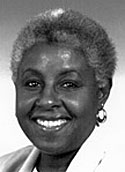 Alumni Stars Alumni Stars
CSM alum and retiree Claire Mack (photo at right) has been selected by the San Mateo County Board of Supervisors as one of the 2008 San Mateo County Women’s Hall of Fame inductees. She is being recognized for her lifelong commitment to improving the quality of life in the local community. Mack has served as mayor and council member for the City of San Mateo and has been a tireless advocate for the community. At CSM’s 2005 commencement ceremony, she was honored with the college’s distinguished alumni award. She worked at KCSM for 29 years as a producer and host of local television and radio shows which aired on KCSM and KGO; she also served as community affairs coordinator. Mack was the founder and former producer of Jazz on the Hill, the fund-raising jazz concert that benefited KCSM-FM.
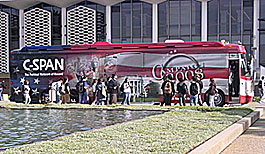 C-SPAN Bus Makes Stop at CSM C-SPAN Bus Makes Stop at CSM
On March 11, the C-SPAN Election Bus as part of its Road to the White House program, made a visit to CSM to speak with members of the college community about the presidential election. The Campaign 2008 Bus, a 45-foot long production studio, parked on the mall in front of the library for a two-hour period. During this time, the Bus crew interviewed students, faculty and staff. The goal of C-SPAN’s Election Bus is to raise awareness of key political events as it visits schools and communities. During the 2008 election season, the bus has been traveling throughout the country following candidates on the campaign trail to promote and enhance C-SPAN’s extensive coverage of the 2008 presidential race.
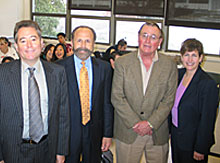
Assembly Candidates Visit Political Science Classes
Students in Frank Damon’s American Politics and California State and Local Government classes recently received a first-hand lesson in the political process when the three candidates for 19th Assembly district participated in an in-class candidate forum. Jerry Hill, member, San Mateo County Board of Supervisors; Richard Holober, president of the board of trustees, SMCCCD; and Gina Papan, mayor of Millbrae, shared their views on major issues followed by a question and answer period. In addition, Jackie Speier, candidate for the 12th congressional district, visited Damon’s classes earlier in the semester. (Image at right: Holober, Hill, Damon and Papan)
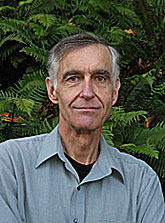 President’s Lecture Series Welcomes Dr. Stephen Bezruchka President’s Lecture Series Welcomes Dr. Stephen Bezruchka
Dr. Stephen Bezruchka, a senior lecturer at University of Washington School of Public Health and Community Medicine and emergency room physician will be the featured speaker for the President’s Lecture Series: Diverse Voices in Writing, on Wednesday, April 23 from 12:10-1pm. Dr. Bezruchka’s particular areas of research are population health and societal hierarchy and its application to health. He is the author of numerous books and articles, including Altitude Illness: Prevention and Treatment and Trekking in Nepal: A Traveler’s Guide. He was also named Teacher of the Year in 2002 at University of Washington School of Public Health and Community Medicine. Immediately following the lecture, Dr. Bezruchka will conduct a seminar session, from 1-2 pm in the Choral Room. This series is made possible by a generous grant from the Lane Family Charitable Trust.
A Message from PR & Marketing
CSM at the 2008 San Mateo County Fair; A call for participation.jpg)
Last summer, CSM returned to the San Mateo County Fair to find the community receptive as we offered inviting and informative program and services exhibits. With a dedicated core of volunteers to staff our individual "booths"-all located in one large exhibition room-we featured our horticulture, engineering, art, math/science, cosmetology, music and community education programs, along with financial aid services. We also staffed a general marketing table. Hundreds of fair goers stopped by, with plenty of goodwill garnered. Also, a number of visits led to new enrollments.
This year, we'd like to follow-up that success with an even a bigger showing, with multiple exhibits, multiple ways to showcase our college.
Today, we are asking you to mark your calendars and consider participating. We will be at the fair on the following dates: August 8-10 and 15-17. To programs, departments and services, we would like you to consider hosting an exhibit. To individuals, please consider volunteering to staff exhibits or perform other fair related functions.
Soon, you will be receiving an email with an exhibit description form and more specifics on how to participate. In the meantime, please contact Bev Madden at maddenb@smccd.edu or extension 6538.
CSM online printed schedule now has enhanced navigational features
Searching through the printed schedule online is now easier than ever, thanks to a recent upgrade to its navigational capabilities. The pages turn simply with the use of your mouse. You click on a topic in the Table of Contents and are sent directly to the page where information about it resides. All Web site links are live. All email addresses are live. Users will need Flash to make use of the new surfing features. But if they don't, a pdf version of the printed schedule is still available online, as it has been in the past. Here's the site to visit for a test run of the enhanced schedule: collegeofsanmateo.edu/schedule.
New sites improve CSM's Web presence
CSM's baseball, women's basketball, softball, dental assisting and dental hygiene programs are all sporting new Web sites these days, according to a planned Web redesign effort. Please take a look at the sites, search their sections. For your convenience, here are their URL's:
CSM's calendar of events
Although the semester is winding down, we still have a number of events taking place on campus, including astronomy, music, health and dance events. Check them out at events calendar. If you would like an event on our calendar listing, please provide the following information by email (habeeb@smccd.edu), phone (extension 6442) or in person (Building 1, Room 157):
- Name/title, date and times of the event
- Location
- The event's cost, if any, and intended audience (e.g., free and open to public)
- Contact information (phone number, email address and/or Web site URL)
- Additional information (please limit to 25 words)
- Electronic photo or art with photographer/artist credit information.
|

